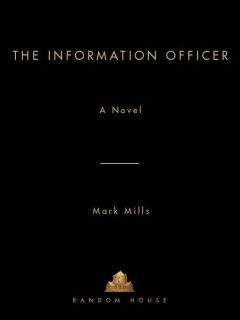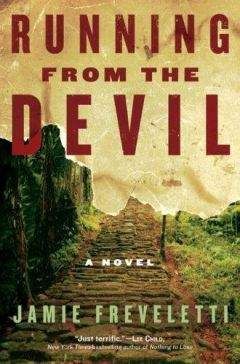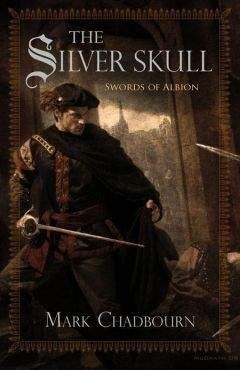Mark Mills - The Information Officer

Все авторские права соблюдены. Напишите нам, если Вы не согласны.
Описание книги "The Information Officer"
Описание и краткое содержание "The Information Officer" читать бесплатно онлайн.
Today, pleasingly, this arrogance came at a price. A 109 banking over Fort Saint Elmo appeared to stagger, then its starboard wing dipped sharply and it spun away. There was no question of the pilot baling out at that height, and the aircraft hit the water, throwing up a white feather of spume near the harbor entrance.
“Welcome to Malta, you sonofabitch,” said Elliott darkly, as the cheers resounded around them.
Moments later, a couple of fighters swooped down onto Marsamxett Harbour from the direction of Floriana, flying tight down on the water, setting themselves for a strafing run at the submarine base on Manoel Island. There were no subs to be seen; they had recently taken to sitting out the daylight hours on the harbor bottom.
“Macchis,” said one of the young pilots.
He was right, they were Italian planes, blue Macchi 202s. If there had been any doubt, the showman-like flourish with which they rolled away after releasing a couple of savage bursts of cannon fire settled the question of their nationality. The Italians were known, and mocked, for their aerobatic flair. Both aircraft made a second pass, their guns churning up the water in neat straight lines as they bore down on the base. They pulled away in a climbing turn to the left, making off to the north, skimming over the stepped rooftops of Sliema.
Their course brought them straight toward Villa Marija, the roar of their engines building quickly to a painful pitch, almost deafening, but not so loud that it drowned out the report of the first rifle shot. Or the second.
Max turned in time to see Vitorin Zammit fire off his third shot, in time to see a portion of the lead Macchi’s engine cowling fall away.
“My God, I think he hit it!” someone called.
Old Zammit had not only hit it, he had actually done some damage. The Macchi’s engine coughed, clearing its throat, then coughed again, and again, misfiring badly now, a ribbon of black smoke snaking out behind it as it climbed toward Saint Julian’s.
“Well, holy shit,” said Elliott.
The trickle of smoke soon became a raging torrent, and the Macchi started to lose height, falling well behind its companion.
“Is it possible?” Freddie asked incredulously.
“Oh yes,” replied Max. A number of enemy fighters had been brought down over the airfields by rifle fire since the long-suffering ground crews had been issued with Lee-Enfields—a gesture intended to boost their morale. No one had expected them to actually hit anything.
It came to Max quite suddenly what he had to do. He glanced over at Vitorin Zammit, who was staring in dumb disbelief at his handiwork. Then he turned and took Pemberton by the arm, leading him off through the crowd.
“Where are we going?” asked the Information Office’s newest recruit.
“To work.”
HE LAY STRETCHED OUT ON THE MATTRESS, NAKED, staring at the ceiling and the dancing shadows thrown by the small pepper-tin lamp.
He raised his arm and examined it in the flickering light, flexing his elbow, his wrist, his fingers, enjoying the silent articulation of the joints, the play of muscle and sinew beneath the skin.
He was proud of his hands. Men didn’t notice hands. Women did. His mother had. She had always praised him for his hands. Then again, kind words had come easily to her, maybe too easily for the compliments to have had any real value. She had scattered them about her like a farmer spreading seed from a sack.
He saw her now as a young woman: the blue of her wide-set eyes; the arched eyebrows, dark and dense, which she’d refused to pluck as other women did because Father had liked them just the way they were. Or so he’d said.
My, you’re looking handsome today.
I think that’s the best I’ve ever heard you play the piano.
The best day of my life? When I gave birth to you.
You’re the best boy in the world.
She’d come from parents with low intellectual horizons, and she’d used words such as “best” a lot.
Maybe that’s what lay at the heart of everything. She had never felt worthy of the world in which she’d found herself, not worthy of the man who had taken her by the hand and led her into Eden. See all this? This is my world, but now it is yours too.
But Eden didn’t come cheap—she must have learned that early on—and she had chosen to repay cruelty with kindness. She was known for her kindness. It was what defined her in the eyes of others. No one was unworthy of her selfless ministrations.
He suspected now that some baser urge had lain behind her behavior: an instinct for survival. How could her husband possibly harm such a kind and decent person, such a good wife?
It hadn’t worked, but she had kept the faith. It was hard to respect her for it, but at least it had shown a certain determination.
You’re the best boy in the world.
He saw her now, ruffling his hair, smiling warmly down at him, her prominent incisors, the small white scar on her lower lip from the time Father had struck her with a shoe. And he saw what she was doing: one person looking to provide the love of two. The intentions had been good, if ultimately counterproductive. The more she had smothered him with maternal affection, the more Father had felt the need to counteract her “damned pampering” of him.
It was strange that she had never stopped heaping praise upon all and sundry, even after the accident, when there was no longer any need to do so. He also found it strange that she had never taken tweezers to those unruly eyebrows when she must surely have wanted to, when at last she could.
That’s what annoyed him most, he realized—that even after Father was gone, he had managed to live on in her.
He lowered his arm to the mattress and smiled at this thought, a smile of pleasant surprise. When was the last time he had cared enough about anything to be annoyed by it?
It made him feel almost human.
DAY TWO
FREDDIE WAS ALMOST AN HOUR LATE FOR THEIR MEETING at the mortuary. When he finally appeared, reeking of iodine, from the bowels of the hospital building, he seemed surprised to find Max still waiting for him.
“I thought you’d be gone.”
“I heard what happened—of course I waited.”
“Yes, a nasty business.”
It certainly was. A passing orderly had explained the situation to Max. A wayward bomb had fallen well short of the dockyards during the early-morning raid and exploded at the entrance to a shelter in Marsa. Everyone had been safely inside by then, but it would have been far better for all of them if they’d stayed at home. The steel doors of the shelter had been blown in, and the Maltese not torn apart by the hail of metal had found themselves consumed by the ensuing fireball.
Freddie had obviously made an effort to scrub up after his labors, but had missed a couple of spots of blood on his cheek. Max tried his best to ignore them.
“I don’t know how you do it.”
“It’s what I trained for.” Freddie shrugged.
“Really? This?”
Freddie smiled weakly. “Well, not quite this.” He fished a lighter and a packet of Craven “A”s from his pocket. “Sometimes I wish they’d just invade. Then it would all stop.”
“If it stops here, it just gets worse in a lot of other places.”
“I suppose.”
They all knew the reasoning; there was no point in going over it again.
“Do you want to get some air?” asked Max.
“No. Let’s get it over with.” Freddie held out the packet of cigarettes.
Max raised his hand, declining the offer. “I’ve just put one out.”
“Take one,” said Freddie. “For the smell.”
Max had been in hospitals before, but only ever to visit wounded friends. Those airy, spotless wards with their ordered rows of beds and their gruff thick-ankled nurses had nothing in common with the mortuary of the Central Hospital.
The mortuary occupied a run of vast and gloomy ground-floor rooms. The windows were partially shuttered, allowing in just enough light to make identification possible. Corpses carpeted the tiled floors. Some of the bodies were covered, others not, and some weren’t bodies at all.
“We’re out of blankets, I’m afraid,” said Freddie as they picked their way through the first room. He might just as well have been apologizing to a house guest, and his matter-of-factness went some way toward calming Max’s nerves. An orderly in what must once have been a white coat was mopping the floor. He was young—too young, you couldn’t help thinking, to be exposed to such sights. His tin pail screeched in protest as he maneuvered it around the floor with the mop. It was the only sound. The stench was indescribable.
The second room was almost as large as the first, and the thing Max noticed immediately was a pile of limbs stacked up in the corner like so much firewood. The next thing he noticed was a Maltese man emptying the contents of his stomach onto the floor. He was being held around the shoulders by a ragged old fellow in a threadbare suit emitting deep and sonorous sobs. They had evidently just identified the body at their feet, and an orderly looked on awkwardly, clipboard poised to register the details.
It was a pathetic sight, upsetting—two broken men bent over a broken body—and Max was relieved when Freddie led him through double swing-doors out of the charnel house and into a long corridor.
“There are so many.”
“It’s been a bad week. And coffins are hard to come by, so they lie here for days, backing up.”
“Some of them are, well, remarkably intact.”
“Blast victims, snuffed out by the shock wave. Although it often scalps them.”
Their destination was a small room at the far end of the corridor. Aside from a wooden desk in the corner, the room was empty. Max’s relief was short-lived, though; he hadn’t spotted the gurney pushed up against the wall behind the door. A body lay on it—a woman, judging from the bare feet poking out from beneath the piece of tarpaulin that covered her.
“This is what you wanted to show me?”
“She was found yesterday morning in Marsa, lying in the street.” He reached for the tarpaulin.
“Freddie, I’m not sure I …” He trailed off.
“There are some wounds, but I’ve cleaned them up.”
“What’s this all about? I don’t understand.”
“You will.”
“Try telling me now.”
He was already steeling himself against the long walk back past the silent ranks of damaged and dismembered corpses; the thought of scrutinizing one of them up close filled him with alarm and horror.
Freddie didn’t release the tarpaulin. “Max, you’re my friend, and I don’t know who else to tell.”
They looked at each other in silence. Then Max nodded and Freddie folded back the tarpaulin.
The girl was young, maybe eighteen or nineteen, with an innocent beauty that even the cold pallor of death couldn’t erase. Her hair was long, straight, black as bitumen, and it framed an oval face that descended to an elfin chin. Her lips were large and surprisingly red. Lipstick, he realized. Which was odd. It was in short supply, and not many Maltese girls wore it at the best of times.
Freddie tilted her head to the right and gently drew back her hair. A raw and ragged gash ran from beneath her right ear toward her collar bone, widening as it went.
“Christ …”
Freddie’s hand delved beneath the tarpaulin and produced a jagged shard of metal, twisted and razor-edged. “Ack-ack shrapnel. It was still in her when she was brought in.”
It was a common cause of injuries and deaths, the lethal hail of metal dropping back to earth from exploding artillery shells. You could hear the splinters tinkling merrily in the streets and on the rooftops whenever a raid was on, a deceptively harmless sound.
“She bled to death?”
“It looks that way.”
“So?”
Freddie hesitated. “I think it was made to look that way.”
“What do you mean?”
“I mean these … and these.” Freddie raised her wrists in turn. The marks were faint, easy to miss.
“Rope burns?”
“Her hands weren’t bound when she was found. And look at her nails.”
They were long, painted red, and several of them were cracked or broken.
“She fought back. There’s also some bruising around her shoulders and her thighs. Also her labia.”
What a horrible word. It struck Max, enough to extinguish all thoughts of carnality. It was about all he could think as he struggled to take in what Freddie was telling him.
“You think she was violated?”
“I know she was violated. And probably by the same man who then killed her.”
“Freddie, come on. That’s a leap too far.”
“She’s not the first.”
“What?”
“There have been others, two others I’ve seen since the beginning of the year. Not like this, not exactly. One had been crushed by falling masonry; the other one had drowned.”
“Drowned?”
There were many ways to die on Malta, but drowning wasn’t the first that sprang to mind, certainly not since the beaches had been wired off against invasion.
“She fell into a collapsed cistern while walking home in the dark. At least, that’s the way it looked. Both were sherry queens from the Gut.”
“Sherry queens” was service slang for the Maltese dance hostesses who worked the bars and bawdy music halls that infested the lower end of Strait Street in Valetta, a disreputable quarter dubbed the Gut.
“Jesus Christ, Freddie. You should have told someone.”
“What makes you think I didn’t? Apparently the matter is now in the hands of the appropriate authorities.”
“Sounds like lieutenant governor’s office speak.”
“You should know.”
He certainly did. The Information Office answered directly to the lieutenant governor and his coterie of self-important lackeys.
“So why am I here?”
“Because she had something on her that changes everything. Something in her hand. I had to pry it out. Rigor mortis had set in.”
Freddie reached into the hip pocket of his khaki shorts and handed something to Max. It was a piece of material—a cloth shoulder tab, torn where it had been ripped from a uniform. Enough of it remained, though.
“Oh Christ,” said Max.
“That’s one way of putting it.”
Max’s apartment was a short walk from the hospital through the streets of Floriana. He passed a long line of women queuing for paraffin. There was some kind of scuffle taking place that involved a lot of raised voices. Spotting Max approach, a rangy young woman with fire in her eyes appealed to him in accented English, “Tell her she wait like all of us.”
“You have to wait,” said Max, without breaking his stride or even turning to identify the culprit.
His indifference was rewarded with a bank of baleful glares and a couple of mumbled curses in Maltese. He ignored them, too numb to care.
He was still trying to process the information sprung on him by Freddie in the mortuary. Whichever way he came at it, it spelled big trouble. Freddie had taken a certain amount of persuading to keep his latest findings to himself, at least for a couple of days. It would give Max time to think the matter through properly, make a few inquiries. What those might be exactly, he wasn’t yet sure. Things would become clearer once they knew who the girl was. Her absence couldn’t go unnoticed for long. She probably had family and friends who even now were discussing the dread prospect of doing the rounds of the mortuaries.
Подписывайтесь на наши страницы в социальных сетях.
Будьте в курсе последних книжных новинок, комментируйте, обсуждайте. Мы ждём Вас!
Похожие книги на "The Information Officer"
Книги похожие на "The Information Officer" читать онлайн или скачать бесплатно полные версии.
Мы рекомендуем Вам зарегистрироваться либо войти на сайт под своим именем.
Отзывы о "Mark Mills - The Information Officer"
Отзывы читателей о книге "The Information Officer", комментарии и мнения людей о произведении.







